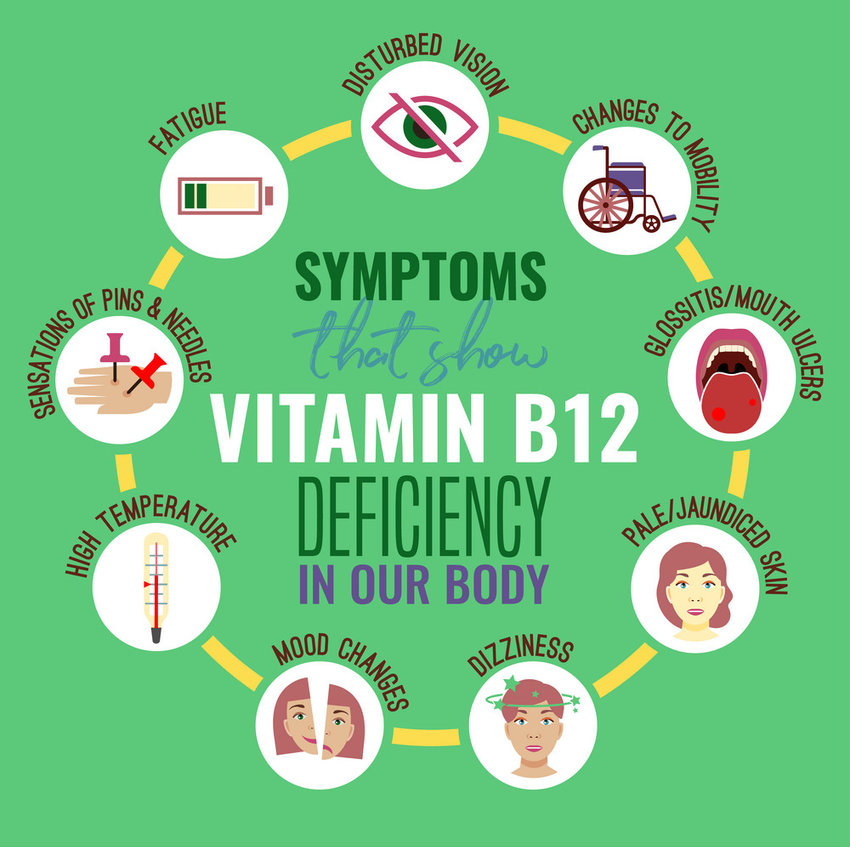Definition
Vitamin B deficiency occurs when the body lacks adequate vitamins B1 and B12 essential for maintaining cell health and energy.
Causes
Several factors may lead to vitamin deficiencies; however, the following are some of the more typical causes:
- Inadequate consumption as a result of particular diets
- Absorption disorders (such as Crohn's disease)
- Drugs interaction
- Alcohol addiction
- Genetic disorders
If you want to know more about Crohn's disease, you can read it here: Crohn's Disease - Definition, Cause, Symptom, And Treatment
Risk Factor
Some conditions that can result in a deficiency of vitamin B are:
- Elderly
- Pregnant women
- Extreme diet
- Vegetarian
- Poverty
Certain demographic groups, such as the elderly and pregnant women, are more susceptible to vitamin B deficiency. These groups need more vitamin B intake.
Meat and dairy products are the primary sources of some vitamins, especially B12. As a result, vegetarians and people in lower socioeconomic situations are more likely to experience deficiency.
Symptoms
A deficiency of vitamin B can manifest in different ways. The manifestations are specific to vitamin B, which is inadequate. The possible symptoms are anemia (red blood cell deficiency), fatigue, confusion, skin lesions, and a compromised immune system.
Vitamin B12
Vitamin B12, or cobalamin, is essential for nerve and brain function. A further function of this vitamin is to contribute to the development and production of red blood cells. An insufficient amount of vitamin B12 can lead to abnormalities in the neurological and blood flow systems.
Vitamin B12 deficiency can lead to megaloblastic anemia, a disorder characterized by the excessive production of large and nonfunctioning red blood cells. Vitamin B12 deficiency can lead to the development of dementia, paranoia, depression, and behavioral abnormalities.
Deficiency in vitamin B12 can result in the following conditions and symptoms:
- Fatigue
- Weak
- Constipation or constipation
- Loss of appetite
- Weight loss
- Paresthesia in the hands and feet
- Vestibular or imbalanced disorders
- Confusion
- Memory lapse
- Difficulty with speaking or chewing
Read more: Dementia - Definition, Cause, Symptom, And Treatment
Vitamin B6
Pyridoxine, or vitamin B6, plays an important role in the metabolic process of transforming food into energy. It helps support the immune system to fight against infection. Pregnant and nursing mothers also require vitamin B6 to support their infants' brain development.
A lack of vitamin B6 might result in the following symptoms:
- Depression
- Confused
- Anemia
- Nausea
- Infection
- Eczema (skin rash or dermatitis)
Vitamin B1 and B2
Vitamin B1 (thiamine) and vitamin B2 (riboflavin) convert food into energy. Vitamin B1 enhances neurological function, while B2 maintains optimal vision. Vitamin B1 and B2 deficits are uncommon due to the widespread fortification of these vitamins in many meals, such as milk and whole grain cereals. Nevertheless, individuals with alcohol addiction may experience a deficiency characterized by symptoms such as cognitive disorientation and fissures in the corners of the mouth.
Vitamin B3
Niacin, or vitamin B3, helps the transformation of food into energy. Along with its role in cell growth, this vitamin supports regular digestion and a balanced appetite. Nausea and abdominal pain are common symptoms of niacin deficiency. Besides mental issues, severe deficiency can also lead to a condition known as pellagra, which manifests itself with symptoms such as:
- Uneven skin tone that darkens when exposed to sunlight
- Bright red tongue
- Vomit
- Discomfort or diarrhoea
- Fatigue
- Paranoid, suicidal, and aggressive
- Hallucinations
Vitamin B9
Folic acid is the other name for vitamin B9. Folate is found in our daily intake. Folic acid is the synthetic version, which can frequently be found in foods that have been fortified or processed. This vitamin, like the majority of the B vitamins, is beneficial for the development of red blood cells. Pregnant women ingest this vitamin also lowers their babies' risk of congenital abnormalities.
Low levels of vitamin B9 might result in the following symptoms:
- Megaloblastic anemia causes weakness
- Fatigue and concentration disorders
- Cranky
- Headache
- Palpitation
- Shortness of breath
- Mouth thrush
- Color changes in skin, hair, or nails
Read more: Vitamin B9 - Indications, Contraindications, And Drug Interactions
Diagnosis
The doctor will perform an anamnesis or medical interview, a physical examination, and supporting examinations to diagnose vitamin B deficiency.
Anamnesis
A medical interview is an interactive session where a doctor and a patient discuss questions and answers. The doctor will inquire about the following:
- Present symptoms
- Medical history of the patients
- Medical history of the family
- Personal daily intake and activities
Physical Examination
During the physical examination, the doctor will evaluate the patient's blood pressure, respiration rate, pulse, and body temperature.
Supporting Examinations
The doctor may also suggest a laboratory analysis to evaluate the levels of vitamin B in your body. A vitamin B assay quantifies the concentration of one or more B vitamins in your bloodstream or urine.
Management
To treat vitamin B deficiency, your doctor will probably advise you to increase your consumption of specific foods containing vitamin B and vitamin B supplements.
Complications
Vitamin B supplementation helps with minor vitamin B deficiency symptoms. However, severe vitamin B deficiency can have worse effects. For examples:
- A lack of vitamin B1 can result in beriberi, damaging the heart, blood vessels, or brain system
- A lack of vitamin B3 can result in pellagra, a skin condition that can progress to dementia
- Vitamin B12 deficiency can result in anemia and irreparable nerve damage
- Vitamin B9 deficiency in pregnant women can result in neural tube defects (spina bifida) in the newborn. If you are planning a pregnancy, take vitamin B9 supplements at least one month before conception and throughout the first trimester to help prevent neural tube defects
Read more about the Spina Bifida, here: Spina Bifida - Definition, Cause, Symptom, And Treatment
Prevention
Certain foods are high in specific B vitamins. Eat a balanced diet to receive all the nutrients your body needs.
The best vitamin B12 sources are:
- Beef liver
- Shell
- Meat, including fish and chicken
- Egg
- Milk
- Cheese
- Fortified morning cereal
- Nutritional yeast
- Additional fortified foods, including dairy products and gluten-free flour
Foods high in vitamin B6 include:
- Chicken, fish, and internal organs
- Potatoes and starchy vegetables
- Fruit, except oranges
Sources of vitamin B1 include:
- Whole wheat
- Fortified bread, cereal, pasta and rice
- Pork
- Fish
- Beans, including black beans and soybeans
- Grains
Sources of vitamin B2 include:
- Egg
- Internal organs, including kidneys and liver
- Lean meat
- Low-fat milk
- Green vegetables, including broccoli and spinach
- Fortified cereals, wheat, and bread
Food sources high in vitamin B3 include:
- Meat, including chicken, beef, pork, and fish
- Nuts and oats
- Fortified breads and cereals
Food sources high in B9 include:
- Beef liver
- Asparagus
- Bean sprouts
- Dark green vegetables, such as spinach
- Oranges and other fruit
- Nuts
- Grains
When to see a doctor?
Visit a medical professional if you could be at risk of vitamin B deficiency. Get expert advice about dietary guidance and determine whether or not you require nutritional supplements.
Want to know more information about other diseases? Click here!
- dr. Monica Salim
Heitz, D. (2020), Symptoms of vitamin B deficiency, Healthline. Healthline Media. Available at: https://www.healthline.com/health/symptoms-of-vitamin-b-deficiency (Accessed: February 8, 2023).
Vitamin B deficiency (2022) healthdirect. Healthdirect Australia. Available at: https://www.healthdirect.gov.au/vitamin-b-deficiency (accessed February 8, 2023).
Vitamin B test: Medlineplus medical test (no date) MedlinePlus. U.S. National Library of Medicine. Available at: https://medlineplus.gov/lab-tests/vitamin-b-test/ (Accessed: February 8, 2023).








